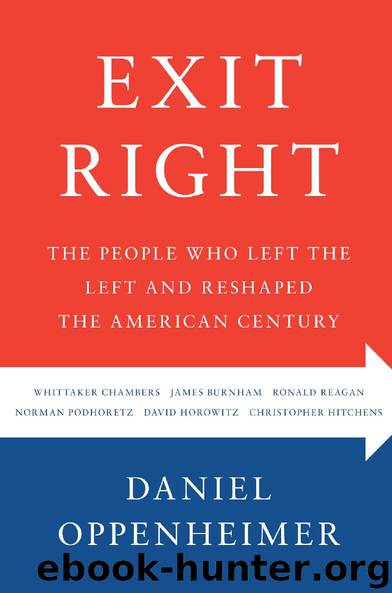Exit Right by Daniel Oppenheimer

Author:Daniel Oppenheimer
Language: eng
Format: epub
Publisher: Simon & Schuster
4
* * *
* * *
Mr. Yes, Mr. No: Norman Podhoretz
The trouble is that Podhoretz has a great ridiculous fat-bellied mind which he pats too often. 1
—ALLEN GINSBERG
By three o’clock in the morning—the hour Scott Fitzgerald said it always was in the deep, dark night of the soul—I had decided to say No to the dying fifties and Yes to the coming sixties, to whose more adventurous and youthful spirit my first act of dedication would be accepting the editorship of Commentary, and my second, the effort to transform Commentary into its evangelical voice. 2
—NORMAN PODHORETZ
In the spring of 1957 Norman Podhoretz, a twenty-seven-year-old editor at Commentary magazine, published an essay titled “The Young Generation of U.S. Intellectuals.” It began by posing a question that was already, only a few years into his young career, recognizably Podhoretzian. Who was this newest generation of intellectuals? he asked, as though everything depended upon it. What did they believe? How were they different from those who preceded them?
“What makes it especially difficult to characterize the younger generation of intellectuals in this country is that they have not been articulate about themselves,” wrote Podhoretz. “They have found no spokesman to voice their protests or to proclaim their aspirations; nor have they produced a This Side of Paradise or a Farewell to Arms in which they might imagine themselves defined for all time, in which they could see themselves dramatized, and from which they could derive a sense of their own significance, of their peculiar mission in history.” 3
The cause of this formlessness, in the literary intellectual identity of his generation, wasn’t that the culture was alienating, as it had been for Chambers and his fellow ernste menschen in the 1920s, or that it was falling apart, as it had been in the 1930s. It arose, rather, from a lack of resistance. In this sense, though from a very different perspective, Podhoretz was responding to the same phenomenon Ronald Reagan was: The liberals had won. They had won in matters of governance and policy most obviously, but even more profound was the victory they’d achieved in the realm of ideas. By the 1950s there was a liberal consensus in America that seemed so broad and settled it was hard to imagine it ever unraveling.
For Reagan this was a crisis of civilizational proportions. If the tide didn’t turn soon, if people didn’t rise up to take charge of their destinies, then the future would be, if not necessarily Orwell’s nightmare vision of a boot stamping on the human face forever, then something almost as horrifying for its lack of drama. Half-men and half-women, well compensated and cared-for by the social engineers of the state, the union, and the corporation, going about their lives of earning and eating and reproducing, slowly forgetting what it means to be fully human. At stake, too, was the nation’s ability to respond forcefully and strategically to the threat of communism. Half-men would not be up to the task.
For Podhoretz, a ravenously ambitious intellectual of the liberal Left, the consensus was terrifying for entirely different reasons.
Download
This site does not store any files on its server. We only index and link to content provided by other sites. Please contact the content providers to delete copyright contents if any and email us, we'll remove relevant links or contents immediately.
| Anarchism | Communism & Socialism |
| Conservatism & Liberalism | Democracy |
| Fascism | Libertarianism |
| Nationalism | Radicalism |
| Utopian |
The Secret History by Donna Tartt(18056)
The Social Justice Warrior Handbook by Lisa De Pasquale(11930)
Thirteen Reasons Why by Jay Asher(8399)
This Is How You Lose Her by Junot Diaz(6401)
Weapons of Math Destruction by Cathy O'Neil(5779)
Zero to One by Peter Thiel(5444)
Beartown by Fredrik Backman(5293)
The Myth of the Strong Leader by Archie Brown(5204)
The Fire Next Time by James Baldwin(4986)
How Democracies Die by Steven Levitsky & Daniel Ziblatt(4932)
Promise Me, Dad by Joe Biden(4890)
Stone's Rules by Roger Stone(4818)
100 Deadly Skills by Clint Emerson(4647)
Rise and Kill First by Ronen Bergman(4527)
A Higher Loyalty: Truth, Lies, and Leadership by James Comey(4520)
The David Icke Guide to the Global Conspiracy (and how to end it) by David Icke(4348)
Secrecy World by Jake Bernstein(4342)
The Farm by Tom Rob Smith(4294)
The Doomsday Machine by Daniel Ellsberg(4220)
